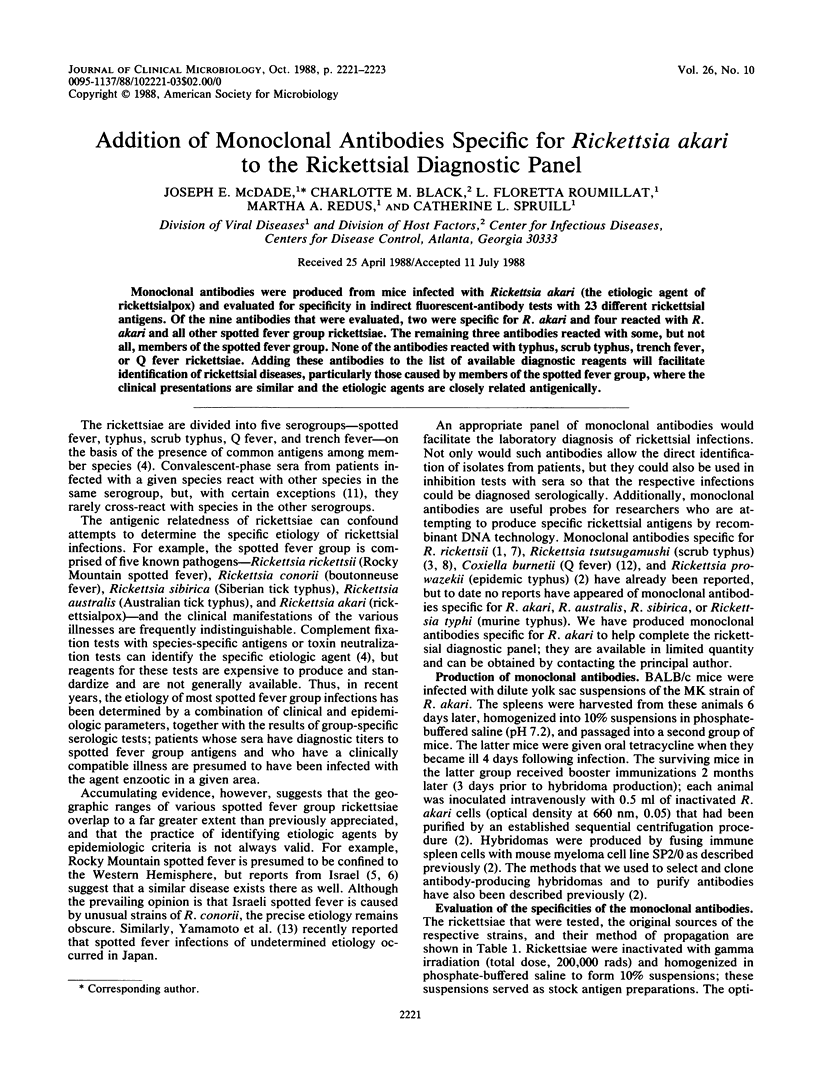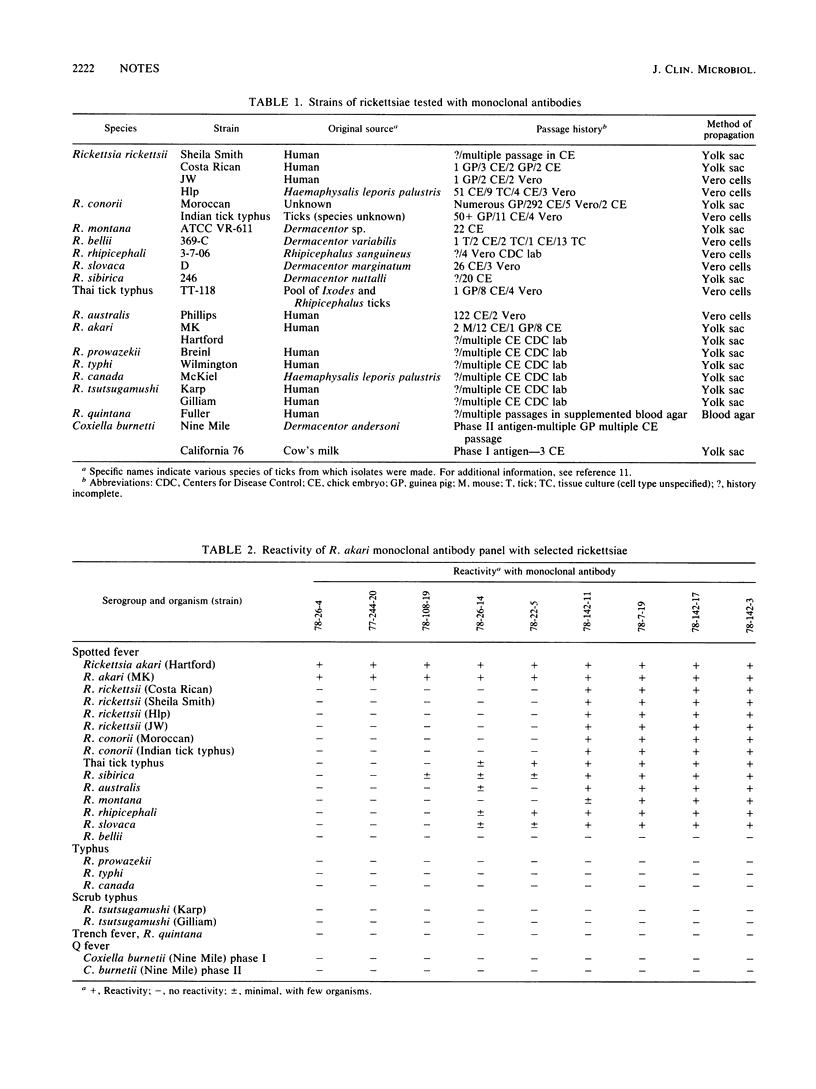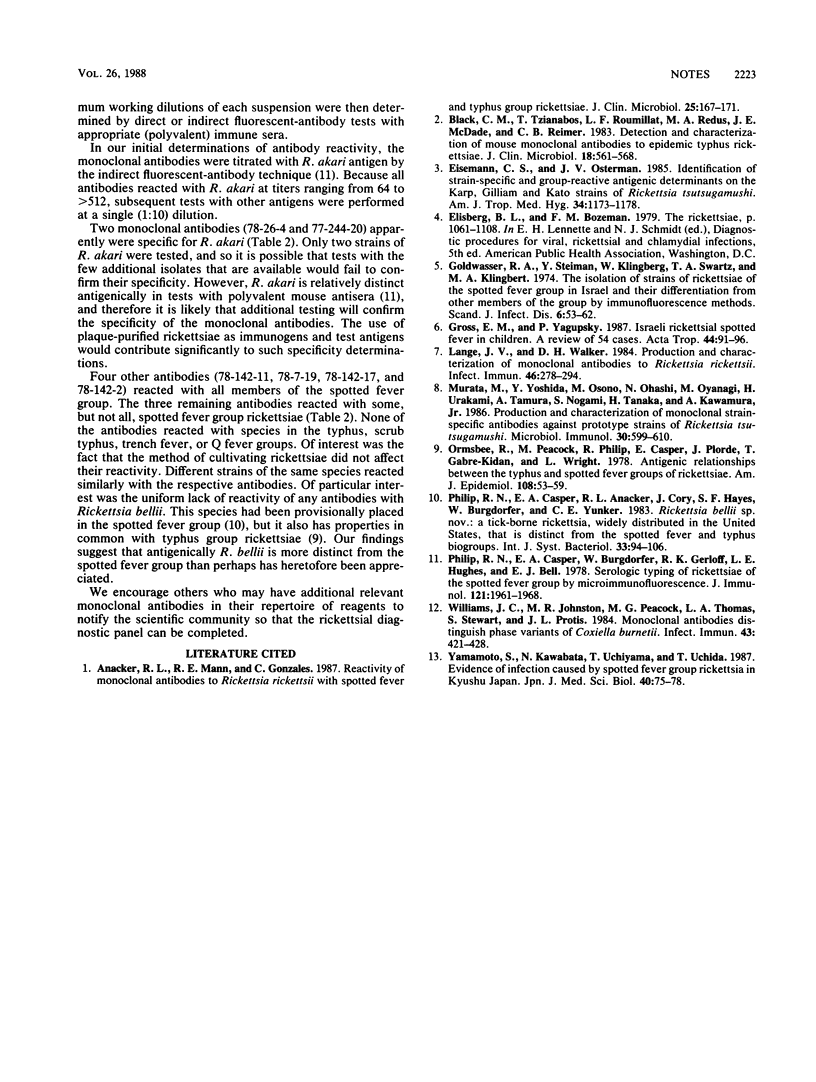Abstract
Monoclonal antibodies were produced from mice infected with Rickettsia akari (the etiologic agent of rickettsialpox) and evaluated for specificity in indirect fluorescent-antibody tests with 23 different rickettsial antigens. Of the nine antibodies that were evaluated, two were specific for R. akari and four reacted with R. akari and all other spotted fever group rickettsiae. The remaining three antibodies reacted with some, but not all, members of the spotted fever group. None of the antibodies reacted with typhus, scrub typhus, trench fever, or Q fever rickettsiae. Adding these antibodies to the list of available diagnostic reagents will facilitate identification of rickettsial diseases, particularly those caused by members of the spotted fever group, where the clinical presentations are similar and the etiologic agents are closely related antigenically.
Full text
PDF


Selected References
These references are in PubMed. This may not be the complete list of references from this article.
- Anacker R. L., Mann R. E., Gonzales C. Reactivity of monoclonal antibodies to Rickettsia rickettsii with spotted fever and typhus group rickettsiae. J Clin Microbiol. 1987 Jan;25(1):167–171. doi: 10.1128/jcm.25.1.167-171.1987. [DOI] [PMC free article] [PubMed] [Google Scholar]
- Black C. M., Tzianabos T., Roumillat L. F., Redus M. A., McDade J. E., Reimer C. B. Detection and characterization of mouse monoclonal antibodies to epidemic typhus rickettsiae. J Clin Microbiol. 1983 Sep;18(3):561–568. doi: 10.1128/jcm.18.3.561-568.1983. [DOI] [PMC free article] [PubMed] [Google Scholar]
- Eisemann C. S., Osterman J. V. Identification of strain-specific and group-reactive antigenic determinants on the Karp, Gilliam and Kato strains of Rickettsia tsutsugamushi. Am J Trop Med Hyg. 1985 Nov;34(6):1173–1178. doi: 10.4269/ajtmh.1985.34.1173. [DOI] [PubMed] [Google Scholar]
- Goldwasser R. A., Steiman Y., Klingberg W., Swartz T. A., Klingberg M. A. The isolation of strains of rickettsiae of the spotted fever group in Israel and their differentiation from other members of the group by immunofluorescence methods. Scand J Infect Dis. 1974;6(1):53–62. doi: 10.3109/inf.1974.6.issue-1.10. [DOI] [PubMed] [Google Scholar]
- Gross E. M., Yagupsky P. Israeli rickettsial spotted fever in children. A review of 54 cases. Acta Trop. 1987 Mar;44(1):91–96. [PubMed] [Google Scholar]
- Lange J. V., Walker D. H. Production and characterization of monoclonal antibodies to Rickettsia rickettsii. Infect Immun. 1984 Nov;46(2):289–294. doi: 10.1128/iai.46.2.289-294.1984. [DOI] [PMC free article] [PubMed] [Google Scholar]
- Murata M., Yoshida Y., Osono M., Ohashi N., Oyanagi M., Urakami H., Tamura A., Nogami S., Tanaka H., Kawamura A., Jr Production and characterization of monoclonal strain-specific antibodies against prototype strains of Rickettsia tsutsugamushi. Microbiol Immunol. 1986;30(7):599–610. doi: 10.1111/j.1348-0421.1986.tb02987.x. [DOI] [PubMed] [Google Scholar]
- Ormsbee R., Peacock M., Philip R., Casper E., Plorde J., Gabre-Kidan T., Wright L. Antigenic relationships between the typhus and spotted fever groups of rickettsiae. Am J Epidemiol. 1978 Jul;108(1):53–59. [PubMed] [Google Scholar]
- Philip R. N., Casper E. A., Burgdorfer W., Gerloff R. K., Hughes L. E., Bell E. J. Serologic typing of rickettsiae of the spotted fever group by microimmunofluorescence. J Immunol. 1978 Nov;121(5):1961–1968. [PubMed] [Google Scholar]
- Williams J. C., Johnston M. R., Peacock M. G., Thomas L. A., Stewart S., Portis J. L. Monoclonal antibodies distinguish phase variants of Coxiella burnetii. Infect Immun. 1984 Jan;43(1):421–428. doi: 10.1128/iai.43.1.421-428.1984. [DOI] [PMC free article] [PubMed] [Google Scholar]
- Yamamoto S., Kawabata N., Uchiyama T., Uchida T. Evidence for infection caused by spotted fever group Rickettsia in Kyushu, Japan. Jpn J Med Sci Biol. 1987 Apr;40(2):75–78. doi: 10.7883/yoken1952.40.75. [DOI] [PubMed] [Google Scholar]


